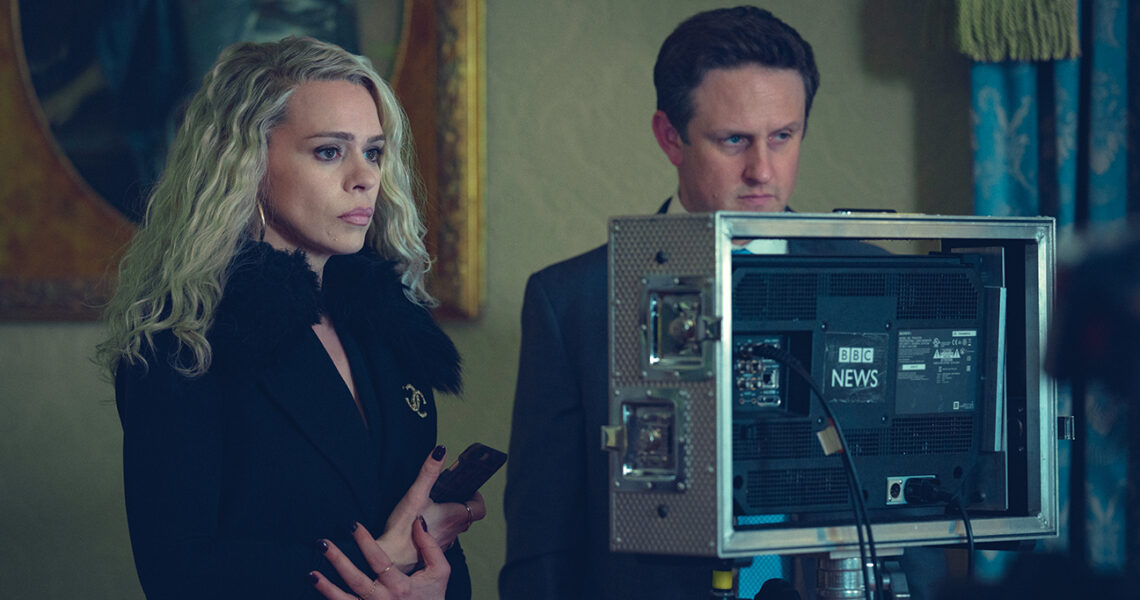The Story behind Prince Andrew’s Infamous Interview
Picture the scene. It’s November 2019, and I’m sitting in Buckingham Palace in England. I’m on an ornate golden chair, pushed up against the wall of the south drawing room, staring nervously at the slightly frayed but elegant red-and-gold carpeted floor. The room is larger than most London flats, and I’m just 15 feet behind the chair of the Queen’s “favorite son,” Prince Andrew. He’s seated with his back to me, his left foot tapping over and over on the palace floor.
In my line of sight is renowned BBC Newsnight journalist Emily Maitlis, who is about to conduct the interview of her life about Prince Andrew’s friendship with prolific sex offender and trafficker Jeffrey Epstein and about the allegations of sexual assault made against him by Virginia Giuffre. It’s an interview that will effectively topple a prince. The atmosphere is electric. There’s a profound silence among all of the television crew. The lights are set, the cameras are ready, the producers and palace staff are completely still.
And then it begins …
What followed was a master class in how not to answer questions in an interview. If you haven’t seen it, spoiler alert, it did not go well for Prince Andrew. During those 48 minutes, the Duke of York gave replies that could have launched a thousand memes. He said he couldn’t have committed the alleged offenses because he was at a Pizza Express in the town of woking with his daughter, that he had a medical condition which meant he couldn’t have been sweating while dancing at a nightclub with Giuffre, and that he didn’t regret staying with Epstein after he’d been convicted of sexual offenses because it was a “convenient place to stay.” Just four days after the interview aired, after the global condemnation of his answers, the same palace issued a statement that Prince Andrew was stepping back from his public role, effectively sacked by his own mother, the Queen. Because of the power of that interview, the power of journalism, he remains a pariah nearly five years later.
So how on earth did that interview happen, and why on earth did he agree to do it? It’s still hard to believe he said yes, even though it was my job, as a booker at Newsnight, to persuade people to come on the show. To be honest, most of the time it was a thankless task — endless rejection, often working for months on something, only for it to fall at the last hurdle.
Screenshot
This interview was the culmination of more than a year of negotiations, visits to the palace, hoping against hope, countless emails and eternal optimism. But I will be honest with you: I never actually thought he would say yes.
But he did.
And then, four years later, I’m sitting in Buckingham Palace again. Except this time, it’s an exquisitely reconstructed one, on a film set, some place outside London. And Prince Andrew and Emily Maitlis are in the room again, except now it’s the usually exquisitely chiseled actor Rufus Sewell (after hours of prosthetics) and the iconic Gillian Anderson as the fictional prince and presenter. We are on the set of the Netflix film Scoop, which is based on my book. It’s beyond my wildest dreams. Billie Piper plays me — magnificently bedecked in my everyday attire (think black faux leather, fake fur, snakeskin boots, lashings of lip gloss, huge handbag, even huger sunglasses), and she’s shaking her blond curls (wig) in the fake room in the onscreen version of my life.
There’s a scene in the movie where I’m chatting to my mum after a particularly bruising day in the office (well, Billie is chatting to my actress mum, Amanda Redman), and she asks me something crucial — “Does it matter?” And, by God, this job and these interviews, they mattered.
Courtesy of Subject
This type of journalism — holding powerful people to account, asking the hard questions, seeking the truth without favor — matters more than ever. And it’s never felt more in peril. Newsnight itself is now a shorter program, and all the BBC journalists depicted in our movie are now doing different jobs (myself included). Every day, there is a new story of jobs cuts and serious journalism at risk. It’s the sad irony that the global success of Scoop comes at a time when these types of scoops are in more peril than ever.
Our film is an homage to the BBC, to the team at Newsnight, to Emily Maitlis and to the brilliant editor at the time, Esme Wren (played by Romola Garai). And to the women journalists who made it all happen.
It’s a salutary reminder of the power and importance of journalism and truth in these uncertain times, to the BBC and to the countless journalists struggling behind the scenes, just as I did, trying to hold power and democracy to account.
Every day journalists all over the world contact me to say that Scoop has inspired them and made them feel they need to carry on.
I feel proud of our movie, proud of what we all achieved. Grateful that Netflix decided to bring this story to life for the world. If you value this kind of accountability, this kind of truth-seeking, please consume it.
If not, the powerful will sleep more soundly at night.
This story first appeared in an August stand-alone issue of The Hollywood Reporter magazine. To receive the magazine, click here to subscribe.

